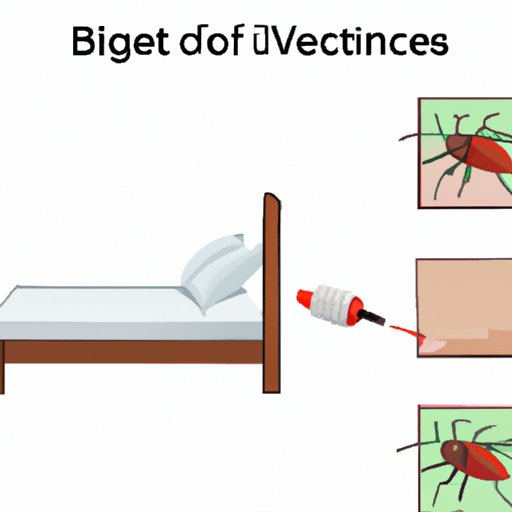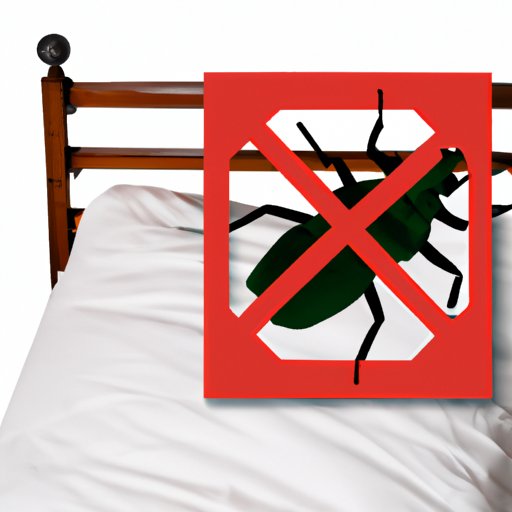I. Introduction
Bed bugs might seem like a myth, but unfortunately, they are a real problem in many homes and hotels across the world. Notoriously difficult to spot, these tiny pests can quickly multiply and cause a lot of discomfort. In this article, we will explore the signs and symptoms of bed bug infestations, offer tips for searching your home or hotel room for bed bugs, discuss proactive measures to help prevent bed bugs, and describe effective treatment options.
II. Signs and Symptoms of Bed Bug Infestation
The most common sign of a bed bug infestation is waking up with itchy, red bites on your skin. However, not everyone reacts to bed bug bites, so it is important to look for other signs as well. Bloodstains on sheets and pillowcases, and a musty odor in the room are other signs that you may have bed bugs.
Bed bugs are notoriously difficult to spot because they are tiny (about the size of an apple seed or smaller) and nocturnal. To help identify them, look for small brown or red bugs, shed skins, and fecal stains on surfaces such as mattresses and furniture.
III. Tips for Searching Your Home or Hotel Room for Bed Bugs
When searching for bed bugs, it is important to conduct a thorough search of your bed and surrounding areas. Bed bugs can also hide in furniture, curtains, and electrical outlets. Here are some tips for searching your home or hotel room for bed bugs:
- Use a flashlight to inspect all areas for bugs, eggs, or bloodstains.
- Look for live bugs or shed skins in crevices and folds of mattresses and furniture.
- Look for fecal stains, which appear as small dark spots on bedding or furniture.
- Check belongings, such as luggage or clothing, that may have come into contact with bed bugs.
- If you find bed bugs or signs of an infestation, avoid transferring them to other areas of your home by sealing items in plastic bags.
Remember, bed bugs can be small and hard to spot. Persistence is key when searching for them.
IV. Proactive Measures to Help Prevent Bed Bugs
The best way to avoid bed bugs is to avoid bringing them into your home in the first place. Bed bugs can hitchhike in on clothing, luggage, and other items. Here are some tips to help prevent bed bug infestations:
- Regularly wash bedding in hot water and dry on high heat to kill any bed bugs.
- Use a bed bug mattress cover to prevent bugs from entering or escaping.
- Make sure to vacuum floors and furniture regularly, and discard the vacuum bag outdoors.
- If you travel or stay in hotels, inspect the room for bed bugs and keep your luggage off the floor and bed. Consider using a plastic bag to store your belongings during your stay.
- If you live in an apartment building, notify your landlord if you suspect bed bugs. They are obligated to provide pest control services.
Anyone is vulnerable to bed bugs, so it’s important to take proactive measures to prevent infestations before they happen.
V. Potential Health Risks Associated with Bed Bugs
While bed bugs are a nuisance, they are not known to spread disease. However, there are potential risks associated with bed bug bites, particularly for those who have an allergic reaction to them. The symptoms of an allergic reaction include:
- A rash or hives
- Difficulty breathing or wheezing
- Tightness in the chest
Although rare, bed bugs can also transmit pathogens and cause secondary infections if the bites are scratched and become infected.
VI. When to Seek Medical Attention
If you experience severe allergic reactions to bed bug bites, seek medical attention immediately. In the case of an infection, contact your doctor to discuss treatment options. If you have been bitten by bed bugs, it is important to resist the urge to scratch to reduce the risk of infection.

VII. Effective Treatment Options for Bed Bug Infestations
If you have a bed bug infestation, it’s important to take action as soon as possible to prevent them from spreading. Treatment options include:
- Hiring a professional exterminator to treat the infested area.
- Using DIY products like bed bug sprays and traps to kill bed bugs.
- Throwing away infested items such as mattresses and furniture.
Successful bed bug treatment often requires a combination of approaches and may take several weeks or even months.
VIII. Conclusion
Bed bugs are a common problem that can cause a lot of discomfort. The signs of bed bug infestations include itchy bites, bloodstains on sheets, and a musty odor. Thoroughly searching your home or hotel room for bed bugs is crucial, as is taking proactive measures to prevent infestations from occurring. Although bed bugs can cause allergic reactions and secondary infections, they are not known to spread disease. Effective treatment options include hiring a professional exterminator, DIY products, and discarding infested items. Remember, persistence is key when dealing with bed bugs.
If you suspect you have bed bugs, don’t hesitate to take action. With the right tools and knowledge, you can prevent bed bug infestations and keep your home comfortable and bug-free.
